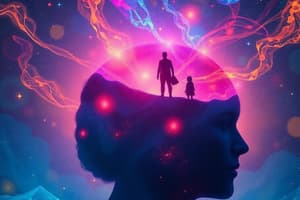Podcast
Questions and Answers
According to activity theory, what is the MOST important factor for a satisfying late life?
According to activity theory, what is the MOST important factor for a satisfying late life?
- Achieving a state of complete relaxation and freedom from responsibilities.
- Accepting the inevitable decline of physical abilities.
- Maintaining an active and involved lifestyle. (correct)
- Severing ties with past relationships to avoid emotional burden.
What is a key limitation of the activity theory of aging?
What is a key limitation of the activity theory of aging?
- It does not specify which types of activities are most beneficial. (correct)
- It fails to recognize the diversity of experiences in old age.
- It overemphasizes the importance of social connections.
- It assumes all older adults have access to the same resources.
How does disengagement theory explain the role of older adults in maintaining social equilibrium?
How does disengagement theory explain the role of older adults in maintaining social equilibrium?
- By promoting continued engagement in the workforce.
- By encouraging older adults to actively seek leadership positions.
- By facilitating the transfer of responsibilities to younger generations. (correct)
- By ensuring older adults remain the primary caregivers in families.
What is one proposed benefit of disengagement for older adults, according to disengagement theory?
What is one proposed benefit of disengagement for older adults, according to disengagement theory?
According to continuity theory, how do older adults typically approach problem-solving compared to their younger years?
According to continuity theory, how do older adults typically approach problem-solving compared to their younger years?
According to the continuity theory, what happens to an individual's sense of self as they age:
According to the continuity theory, what happens to an individual's sense of self as they age:
Which of the following scenarios BEST exemplifies the activity theory of aging?
Which of the following scenarios BEST exemplifies the activity theory of aging?
Which of the following scenarios BEST exemplifies the disengagement theory of aging?
Which of the following scenarios BEST exemplifies the disengagement theory of aging?
If an individual who strongly valued independence throughout their life maintains this value and seeks out self-directed activities in older age, which theory of aging does this exemplify?
If an individual who strongly valued independence throughout their life maintains this value and seeks out self-directed activities in older age, which theory of aging does this exemplify?
Flashcards
Activity Theory
Activity Theory
Staying occupied and involved is necessary for a satisfying late life.
Disengagement Theory
Disengagement Theory
Aging involves a mutual withdrawal from society and relationships.
Continuity Theory
Continuity Theory
As people age, they maintain consistency in their approach to problem-solving, goal-setting, and handling situations.
Study Notes
- Sociological theories of aging include activity theory, disengagement theory, and continuity theory.
Activity Theory
- Proposed in the early 1950s, this theory suggests society expects retirees to remain active as they age.
- Staying occupied and involved is considered necessary for a satisfying later life.
- Avoiding a sedentary lifestyle is essential for health and happiness; older individuals should remain active physically and socially.
- The theory is limited because it does not specify which activities are linked to life satisfaction.
- Being active helps prolong middle age, delaying the adverse effects of old age.
Disengagement Theory
- Introduced in 1961, this theory suggests aging involves a gradual withdrawal from society and relationships.
- Older adults and society both desire this separation, which helps maintain social balance.
- Older adults can escape social responsibilities and have more time for personal reflection.
- Younger individuals take on more responsibilities to keep society functioning smoothly.
- Allows older adults to die more peacefully, without the pressures of a busy social life.
- During late adulthood, both individuals and society withdraw, leading to older adults becoming more isolated and less engaged.
Continuity Theory
- Developed in the late 1960s, this theory suggests that as people age, they continue to see themselves similarly to their younger years.
- An older person's approach to dealing with problems, setting goals, and handling situations remains much the same as when they were younger.
- Older adults keep and adjust their identities while giving up some previous roles and taking on new ones.
- People don’t lose their sense of self as they age.
- A positive attitude about adapting to aging is linked to better views on quality of life.
Studying That Suits You
Use AI to generate personalized quizzes and flashcards to suit your learning preferences.




